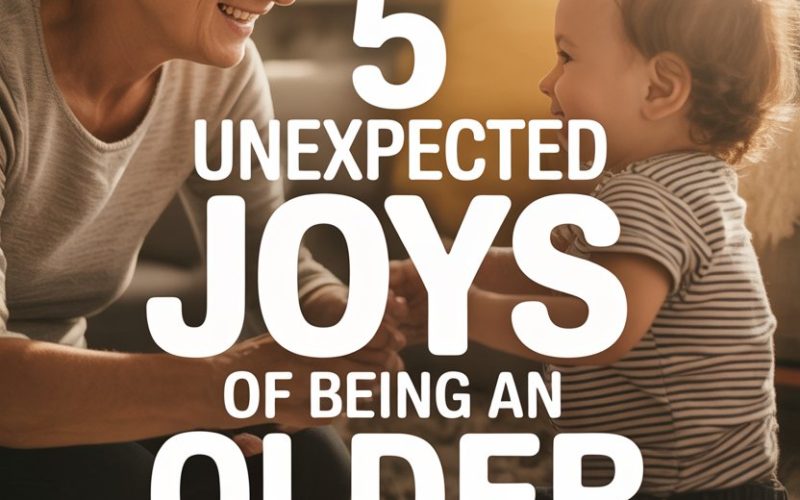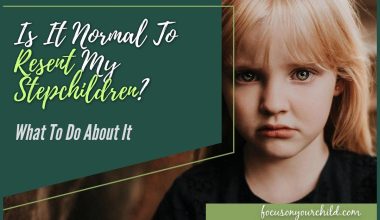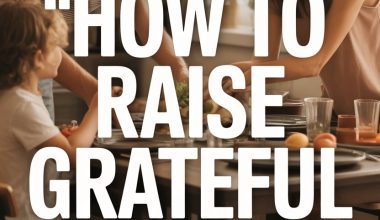You didn’t expect to be here—standing at the school gates, lunchbox in hand, fielding questions about your (surely fabulous) “grandchild.”
Yet here you are, raising little ones when your mates are comparing cholesterol meds and planning river cruises.
And while you might have more grey hairs than the other parents in the playground, there’s a secret: being an older parent comes with some truly delightful perks.
Let’s get right into it.
1. Emotional Wisdom Superpowers
You know those emotional rollercoasters children love to board at the worst possible times? (Supermarket meltdowns, anyone?) Having seen a bit of life, older parents tend to bring a calm to the chaos.
Years of work dramas, relationship hiccups, maybe even adult children, mean your patience is less “short fuse” and more “zen monk with noise-cancelling headphones.”
Research from the Stanford Center on Longevity found that emotional stability grows with age.
Translation: when your six-year-old launches into her Oscar-worthy performance over mismatched socks, you’re far less likely to join in with your own interpretive dance of frustration.
It’s not magic. It’s experience—forgiveness comes easier, so does perspective.
You’ve seen enough drama unfold to know that, honestly, the world will keep spinning, even when the peas touch the mash.
2. Financial Stability Means Fewer Sleepless Nights
Remember your twenties? Pasta for eight nights running, hoping the rent cheque didn’t bounce, wondering if you’d ever afford a car that didn’t wheeze.
Older parents are more likely to have stable careers, established homes, and a bit of a safety net.
This doesn’t mean you’re rolling in cash. It means the basics—nappies, school shoes, a family holiday every so often—aren’t quite so terrifying.
You can say yes to swimming lessons or art supplies without the accompanying pang of guilt. (Okay, maybe just a little pang.)
A recent survey from Pew Research Center found older parents are generally more financially secure than their younger counterparts. That translates into greater confidence when making decisions about your child’s needs.
And if the kids ever question your taste in music, you can remind them who’s funding their Wi-Fi.
3. An Unrivaled Sense of Perspective
Raising children later in life means you come equipped with a mental highlight reel of all the “big things” that turned out to be, well, not that big.
When the school bake sale threatens to become a diplomatic incident (cupcakes or cookies—choose wisely!), you’re less likely to spiral.
Older parents have weathered redundancies, heartbreaks, and maybe even a pandemic or two. The result? A steadiness your children will feel, even if they can’t articulate it.
You know which hills to die on, and which to roll gently down with a wry smile and a cup of tea.
There’s scientific backing here, too. Developmental psychologist Susan Krauss Whitbourne notes that maturity brings flexibility—a trait that’s golden for adapting to those curveballs kids love to throw.
So when your little one insists on wearing a tutu and gumboots to the dentist, you can appreciate it for what it is: a moment, not a crisis.
4. Cherishing the Little Moments (Because You Know How Fast They Go)
You’ve probably heard “it goes so fast!” from every direction, but as an older parent, you don’t just hear it—you feel it in your bones.
There’s a tenderness to the way you approach bedtime stories or their endless questions about worms. Maybe it’s because you’ve already seen how quickly children grow up, maybe it’s because you waited so long.
This mindfulness isn’t accidental. Research in The Gerontologist suggests older parents are more likely to savour the experience of raising children and spend more intentional time with them.
It’s the difference between snapping a quick photo and actually being present for the giggles.
There’s no shame in letting chores slide every now and then, just to soak in those fleeting moments—muddy handprints and all.
You know those photo albums your parents made, stuffed with blurry shots from birthday parties? You’re making your own, except now you’re actually in them, not behind the camera.
5. Parenting on Your Own Terms
There’s a certain freedom that comes with age. You’re less likely to fret over what your neighbour thinks about your parenting choices.
The pressure to keep up with parenting trends, to have the latest eco-friendly bottle or sign up for bi-weekly baby yoga, melts away.
Maybe you’re a bit “old school” in your approach, or maybe you’re the cool parent who can explain what a rotary phone is (and why it’s not a good idea to Google ‘cassette tapes’ with your child—trust me, the existential questions never end).
Older parents can be more confident setting boundaries, trusting their instincts, and laughing off the unsolicited advice from strangers.
You’ve lived enough to know there’s no single right way to raise a child.
And you’re far less likely to lose sleep over whether your kid’s organic, gluten-free, hand-churned lunch is Instagram-worthy. Fish fingers and peas? That’s dinner sorted.
The Silver Linings No One Mentions
Every stage of parenting comes with its own blend of worries and rewards.
Raising children after 40, 45, or even 50 isn’t always easy—knees creak, coffee is more essential than ever, and yes, sometimes you do forget what day it is.
Still, you’re giving your child a version of you that’s more patient, more present, and perhaps a little bit wiser. You have stories to share and a sense of humour sharpened by years of living.
And, on the bright side, you’re always the most experienced hand at chaperoning school trips. Not to mention, you know every shortcut to the cake stall.
If that’s not an unexpected joy, what is?




